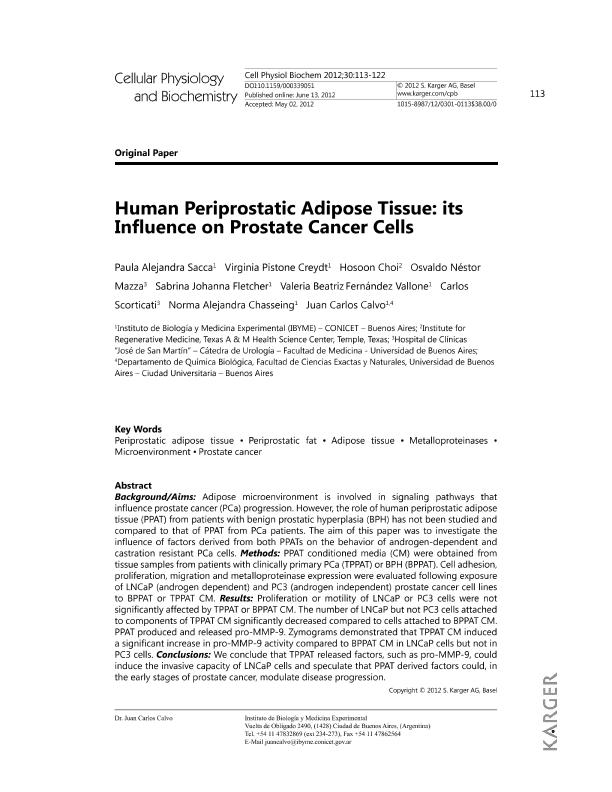Artículo
Human periprostatic adipose tissue: its influence on prostate cancer cells
Sacca, Paula Alejandra ; Pistone Creydt, Virginia
; Pistone Creydt, Virginia ; Choi, H.; Mazza, Osvaldo Néstor; Fletcher, Sabrina Johanna
; Choi, H.; Mazza, Osvaldo Néstor; Fletcher, Sabrina Johanna ; Fernández Vallone, Valeria Beatriz
; Fernández Vallone, Valeria Beatriz ; Scorticati, Camila
; Scorticati, Camila ; Chasseing, Norma Alejandra
; Chasseing, Norma Alejandra ; Calvo, Juan Carlos
; Calvo, Juan Carlos
 ; Pistone Creydt, Virginia
; Pistone Creydt, Virginia ; Choi, H.; Mazza, Osvaldo Néstor; Fletcher, Sabrina Johanna
; Choi, H.; Mazza, Osvaldo Néstor; Fletcher, Sabrina Johanna ; Fernández Vallone, Valeria Beatriz
; Fernández Vallone, Valeria Beatriz ; Scorticati, Camila
; Scorticati, Camila ; Chasseing, Norma Alejandra
; Chasseing, Norma Alejandra ; Calvo, Juan Carlos
; Calvo, Juan Carlos
Fecha de publicación:
06/2012
Editorial:
Karger
Revista:
Cellular Physiology and Biochemistry
ISSN:
1015-8987
e-ISSN:
1421-9778
Idioma:
Inglés
Tipo de recurso:
Artículo publicado
Clasificación temática:
Resumen
Background/Aims: Adipose microenvironment is involved in signaling pathways that influence prostate cancer (PCa) progression. However, the role of human periprostatic adipose tissue (PPAT) from patients with benign prostatic hyperplasia (BPH) has not been studied and compared to that of PPAT from PCa patients. The aim of this paper was to investigate the influence of factors derived from both PPATs on the behavior of androgen-dependent and castration resistant PCa cells. Methods: PPAT conditioned media (CM) were obtained from tissue samples from patients with clinically primary PCa (TPPAT) or BPH (BPPAT). Cell adhesion, proliferation, migration and metalloproteinase expression were evaluated following exposure of LNCaP (androgen dependent) and PC3 (androgen independent) prostate cancer cell lines to BPPAT or TPPAT CM. Results: Proliferation or motility of LNCaP or PC3 cells were not significantly affected by TPPAT or BPPAT CM. The number of LNCaP but not PC3 cells attached to components of TPPAT CM significantly decreased compared to cells attached to BPPAT CM. PPAT produced and released pro-MMP-9. Zymograms demonstrated that TPPAT CM induced a significant increase in pro-MMP-9 activity compared to BPPAT CM in LNCaP cells but not in PC3 cells. Conclusions: We conclude that TPPAT released factors, such as pro-MMP-9, could induce the invasive capacity of LNCaP cells and speculate that PPAT derived factors could, in the early stages of prostate cancer, modulate disease progression.
Archivos asociados
Licencia
Identificadores
Colecciones
Articulos(IBYME)
Articulos de INST.DE BIOLOGIA Y MEDICINA EXPERIMENTAL (I)
Articulos de INST.DE BIOLOGIA Y MEDICINA EXPERIMENTAL (I)
Citación
Sacca, Paula Alejandra; Pistone Creydt, Virginia; Choi, H.; Mazza, Osvaldo Néstor; Fletcher, Sabrina Johanna; et al.; Human periprostatic adipose tissue: its influence on prostate cancer cells; Karger; Cellular Physiology and Biochemistry; 30; 1; 6-2012; 113-122
Compartir
Altmétricas



